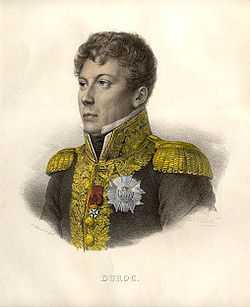Géraud Duroc

Géraud Christophe Michel Duroc, 1st Duc de Frioul (October 25, 1772 – May 23, 1813) was a French general noted for his association with Napoleon.
Early life
Duroc, born at Pont-à-Mousson (Meurthe et Moselle), the son of an officer, was educated at the military schools of his native town and of Châlons.
Military career
The Revolutionary Wars
He was gazetted second lieutenant, (artillery) in the 4th regiment in 1793, and advanced steadily in the service. Captain Duroc became aide-de-camp to Napoleon in 1796, and distinguished himself at Isonzo, Brenta and Gradisca in the Italian campaigns of 1796-1797.
He served in Egypt, and was seriously wounded at Aboukir. His devotion to Napoleon was rewarded by complete confidence. He became first aide-de-camp (1798), general of brigade (1800), and governor of the Tuileries. After the battle of Marengo, he was sent on missions to Vienna, St Petersburg (Russia), Stockholm and Copenhagen.
The Napoleonic Wars
As Grand Marshal of the Palace, he was responsible for the measures taken to secure Napoleon's personal safety, whether in France or on his campaigns, and he directed the minutest details of the imperial household.
After the Battle of Austerlitz, where he commanded the grenadiers in the absence of General Oudinot, he was employed in a series of important negotiations with Frederick William III of Prussia, with the elector of Saxony (December 1806), in the incorporation of certain states in the Confederation of the Rhine, and in the conclusion of the armistice of Znaim (July 1809).
In 1808, he was created duc de Frioul: his duchy was made duché grand-fief for his widow in 1813, a rare - but nominal - hereditary honor (extinguished in 1829), created in Napoleon's own Kingdom of Italy. After the Russian campaign, he became senator (1813).

After the Battle of Bautzen (May 20–21, 1813), the Grande Armée made a slow pursuit of Allied forces. At Reichenbach on the 22nd of May, 1813, a cannonball ricocheted off a tree-trunk, hit Duroc in the stomach, tore open his belly and spilled out his intestines in a gory mess over uniform, saddle and horse,[1] which Napoleon witnessed. Whilst Duroc lay dying inside a farmhouse he requested Napoleon's presence where he apologised to the Emperor for not being able to serve him further, asked him to be a father to his daughter, and then requested him to withdraw so that he was not present at the moment of death.[2] Napoleon bought the farm and erected a monument to his memory.
Memorial
Duroc was buried in The Invalides (for veterans, in Paris) in 1847. The metro station Duroc of the Paris Métro is named after him.
References
 This article incorporates text from a publication now in the public domain: Chisholm, Hugh, ed. (1911). Encyclopædia Britannica (11th ed.). Cambridge University Press. - which names as chief source for Durocs biography the Moniteur Universel (French official state periodical - 31 May 1797, 24 October 1798, 30 May 1813, &c.).
This article incorporates text from a publication now in the public domain: Chisholm, Hugh, ed. (1911). Encyclopædia Britannica (11th ed.). Cambridge University Press. - which names as chief source for Durocs biography the Moniteur Universel (French official state periodical - 31 May 1797, 24 October 1798, 30 May 1813, &c.).- Heraldica.org - Napoleonic heraldry.
|